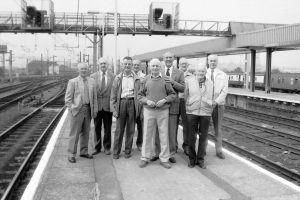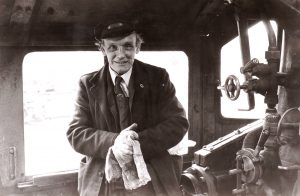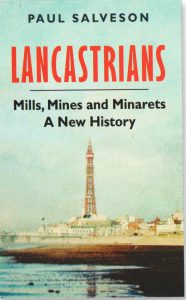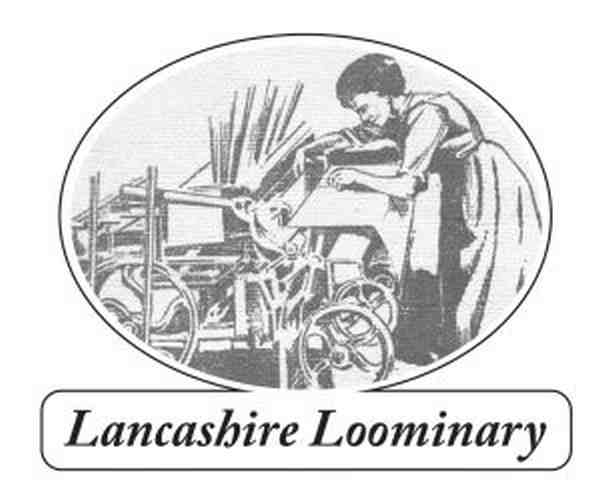The Northern Salvo
Incorporating Weekly Notices, Sectional Appendices, and Northern Weekly Salvo
Published at Station House, Kents Bank, Lancashire-North-of-the-Sands, LA11 7BB and at 109 Harpers Lane, Bolton BL1 6HU (both Lancashire)
email: paul.salveson@myphone.coop
Publications website: www.lancashireloominary.co.uk
No. 321 August 2024
Salveson’s half-nakedly political digest of railways, tripe and secessionist nonsense from Up North.
Post Election Salvo: plenty to be pleased about, but….
It was the Italian Marxist Antonio Gramsci who coined the phrase ‘optimism of the will, pessimism of the intellect’ and that applies very well to my thoughts following Labour’s landslide victory earlier this month. Optimism? Starmer has got off to a good start, with a clear ‘re-set’ from the old regime in terms of relationships with devolved governments and the regional mayors. His appointment of Lord Hendy as Rail Minister was an inspired move though Peter is a loss to Network Rail. At the same time, having a strong Lib Dem presence, and four Green MPs, will help provide a ‘progressive opposition’ to Labour when necessary and hopefully keep them on their toes in terms of green commitments.
Pessimism? Many people have commented on the heroic assumptions that Starmer and his team have made around growth as the way to fund promised investment, rather than increasing general taxation. I hope Starmer and Reeves are right but I have my doubts. A modest increase in taxation, with the main burden falling on the super-rich, would be politically very easy to do. And why not break the longstanding veto on increasing petrol tax?
I’m very wary of Starmer’s strapline that this will be ‘a government of service’. Sounds nice but what does it mean? It sounds very old Labour, top-down politics that ‘we’ll do it for you’. I’d have been happier with the idea of an ‘empowering government’ which gives real power to devolved bodies, right down to the grassroots level.
With that should come a reformed voting system. Just because he odious Farage has made it his ‘thing’ doesn’t mean to say it’s wrong. Labour was very effective in playing the existing system and got a huge majority with a very low share of the vote. If the Tories re-grouped and played a similar game Labour could lose much of its gains from this year. Labour should use its commanding position to start a real debate on voting reform with a view to getting a bill through in this Parliament. But hey, is that a pg that just flew past the window?
As for Reform itself, let’s see if they can consolidate their gains. I doubt it, but who knows? To build an effective political party you need strong grassroots organization, even in this digital age. My guess is that Reform will fall apart quite quickly, with Farage being embraced by a Badenoch-led Tory Party. Bear in mind that Reform isn’t a political party as we know it – it’s essentially a private company owned by Farage with no member accountability.
Great to see the Greens making the long-awaited breakthrough but they need to do a lot more to establish a stronger presence in the North. They’ve been handed a gift with the Gaza issue but that won’t last. For me, I’d like to see them campaigning for stronger devolution with more accountability for the regional mayors through elected assemblies. The same goes for the Lib Dems – who also need to show they are not just the party of the affluent South-east and leafier parts of the North. Who will speak for the workers? Absolutely not Farage, and not Galloway either. Interesting times ahead.
Labour’s rail policies
So far, a mix of good, and not so good. The appointment of Lord Hendy as Rail Minister was an inspired move; let’s hope he has the freedom to make a real difference and address issues such as rail capacity. The dog’s dinner that has been left by the abrupt cancellation of HS2 beyond Birmingham needs sorting. The southern terminus must be Euston, capacity on the West Coast Main Line south of Crewe, and further north, has to be addressed. The proposal being developed by the Greater Manchester and West Midlands mayors for a de-scoped new line from Birmingham to Manchester makes much sense, and is pretty much what The Salvo had been organizing all along (!).
The best thing the new Government could do for the railways in the short term would be to sort out the current industrial relations problems which are making millions of people’s lives a misery. This is an ‘English’ problem – the drivers’ union, ASLEF, has come to agreed settlements in Scotland and Wales as well as Merseyrail, London Overground and with the freight companies. The fault for this damaging dispute dragging on for so long lies firmly at the door of the last Government. As well as settling the pay dispute, it’s about time that Sunday was brought into the working week with a stop put to the huge disruption travellers on Northern in particular are experiencing at weekends.
Many rail supporters have been disappointed by Rachel Reeves’ announcement that the ‘Restoring Your Railway’ fund is being scrapped. I share some of that disappointment but let’s get it in perspective. It was a political ploy from the start, with little cash being available. A lot of time was wasted by promoters developing schemes which were unlikely to see the light of day. The best place for local rail re-openings to sit will be with the regional mayors, who should be given more powers and resources, as well as expansion of the governance model to other area (with more democratic accountability).
Finally, Great British Railways looks like it will emerge in the not too distant future. Let’s hope it has the capacity, skills and powers to make a real difference without stifling either local initiative or for that matter elements of private enterprise, e.g. open access and freight as a whole. It would be good if GBR had a small unit dedicated to innovative ways of supporting local routes, building on the success of Community Rail over the last 30 years but taking it further. More on that in the next Salvo.
Rocket 1830 – 2030
Plans to mark the 200th anniversary of the Liverpool and Manchester Railway are moving forward, with a series of community consultation events having been held over the last few weeks. The four working group chairs (covering Culture, Community, Visitor Economy, Built Heritage and Railway Ops and infrastructure) have met and there will be a general gathering of all members of the groups in September.
Good links have been made with Great British Railways and the team organizing the Railway 200 event next year. Initial discussions have

taken place with the Liverpool and Manchester Railway Trust with some really exciting ideas taking shape around the original 1830 cutting at Edge Hill (site of the famous ‘Moorish Arch’). There’s much more being looked at, with a ‘whole line’ approach being adopted with events at communities all along the original railway. For media enquiries or further information, please contact: Karen Shannon CEO Manchester Histories: karen@manchesterhistories.co.uk
Lancashire Witch 2028! (A Boltonist view of history)
The Bolton and Leigh Railway came first, at least in Lancashire. It opened two years before the Liverpool and Manchester Railway with celebrations kicked off by a gaily-decorated ‘Lancashire Witch’ (as all Lancashire witches are). The line from Liverpool joined up with it, at Kenyon Junction, in 1830 enabling Boltonians (and folk from Leyth, Bent and Bongs) to travel through to Liverpool. A branch extended across Chat Moss into Salford and Manchester.
Timothy Hackworth’s Sans Pareil was one of the first locomotives to be built for the Liverpool and Manchester and featured in the 1829 Rainhill Trials, losing out to Rocket. It later transferred to the Bolton and Leigh. A replica of the original was built in 1980 and, like the original, is part of the national collection. Bolton foundries built several locomotives for the growing rail network around the UK and abroad though sadly this side of the town’s engineering industry never grew as it might have done, losing out to Vulcan Foundry.
A group of enthusiasts have got to together to look at ways the 200th anniversary can be celebrated and some preliminary discussions have been held with the council leadership, which were very positive.
And next year it’s…
2025 is the 200th anniversary of the Stockton and Darlington Railway, which opened on September 27th 1825. It wasn’t the first railway by any means but has a very important claim to world significance. It was a public railway, not a private industrial line. It carried passengers and used steam locomotives. Unlike the Bolton and Leigh (another line

engineered by George Stephenson) there’s a lot left to see, and travel on. This included the historic Skerne Bridge, completed in 1824 and the world’s oldest railway bridge still in use. On behalf of Rocket 200 we paid a visit to Hopetown a week after it had re-opened in mid-July. The site encompasses the North Road Railway Museum, which has had a major re-vamp, as well as newly-restored facilities including the Goods Shed, Carriage Works and ‘Wagon Woods’. Darlington Locomotive Works, managed by the A1 Steam Locomotive Trust, is now linked to the site by a new footbridge.

The works is building Prince of Wales, based on an LNER P2 locomotive.
Our visit was all too brief – next time we’ll visit Shildon, a short train ride up the line to Bishop Auckland with its gallery of mining art and direct link to the Weardale Railway.
Station Library joins forces with The Beach Hut Gallery!
The ‘fusion’ of Kents Bank Station library and its next-door neighbor, The Beach Hut Gallery, is complete, though we’re all still finding our way. The gallery was formed in 2008, displaying top quality work by local artists. The Station library is of course more recent, having been formed less than a year ago, to develop a unique collection of railway and wider transport-related books and magazines, on a working station.
From the beginning of July the Gallery and Library has come under a single management, though with a sub-committee to help with the

library, gallery, publicity and PR and other areas. Four of the trustees of the Library have become directors of the Beach Hut Gallery Ltd – the co-operative which runs the gallery and new members of the co-operative have been recruited. There’s now a much bigger team of volunteers to help run the gallery, library and book sales.
The Gallery and Library will continue to run on co-operative principles, on a not-for-profit basis and both will continue to be staffed on a volunteer basis. The Library, in the basement of Station House, will become part of the co-operative which will own the expanding book collection.
The opening days and times of the Gallery will stay the same (Fridays, Saturday, Sunday and bank holiday Mondays) and the library will also be open at the same time. We could open more frequently but this will be dependent on getting volunteers to staff the library as well as the gallery. Might you be interested? Contact Paul if you’d like to discuss what’s involved.
The gallery will be hosting an exhibition of the work of locally-based artist Ben McLeod. Details to follow but we’re hoping to launch the show with a preview in August. See www.thebeachhutgallery.com
Donations still welcome
We continue to get donations of railway and transport-related books. We accept most transport related books that are in good shape, but may sell on some duplicates to raise funds for the library.We also welcome copies of contemporary transport magazines for our Reading Room.

We welcome bound magazines but not loose ones, of which we have a large pile which are free to good homes. Keep an eye out on www.stationlibrary.org.uk . If you want to send anything by post our postal address: Station House, Kentsford Road, Kents Bank, Grange-over-Sands LA11 7BB
Dodgin’ th’trams
That’s an old Lancashire saying when you’ve had a bit too much and the walk home was a perilous venture, with all those trams whizzing around. Typical of these ‘gondolas of the people’ is the preserved Boltob Corporation ‘Tramcar 66’. It belongs to the Bolton Tramcar Trust and is in the safe keeping of Blackpool Transport at their Starr Gate depot. It is allowed out a coule of times a year and we were very fortunate to join several other friends, fellow

Boltonians and tram enthusiasts for a trip up to Fleetwood and back. We also managed to do a trip up to the newly-opened North Station.
Railwaymen (and women!) remembered
The following personal accounts of railway life came out of an oral history class I taught, called ‘Railwaymen Remember’, for the University of Leeds in 1994. The class members were mostly retired drivers, a few former guards and signalmen and one remarkable lady, Eunice Bickerdyke, of Normanton (below). The stories were put together as ‘Messroom Gossip’, but were never published. I’m hoping to feature some of the stories in the next few issues of The Salvo. Hope you enjoy them!
FRED NORTH
Fred’s was another railway family. His father was a driver at Manningham shed, Bradford. Fred started his footplate career in the late 1930s. He worked at Manningham, Copley Hill, and finally at Holbeck sheds. Fred’s dad was the driver of the LMS ‘Jubilee’ loco 5660 Rooke when it made record performances over the Settle-Carlisle Line.
Brothers in Unity
“There’s always been rivalry between the different railway companies. It’s still there among older railwaymen! We used to call the LMS “Let Me Sleep”! But there was often a nasty edge to it. I can remember drivers on the GN saying about a transferred driver, “Don’t talk to him, he’s a Midland man”. I used to like the GN gauge lamps, and I’d

often try and swap a few cloths for one of them! The rivalry could get serious when promotion was involved. When someone came in from another shed he’d put you back for promotion. It wasn’t his fault, of course. But often these transferred men were treated with hostility.
I can remember worrying when I transferred to Copley Hill, the GN shed. I was a Midland man, and I’d seen men at Holbeck sent to Coventry by some of the other men. I always challenged this, and I’m glad that I was well received at Copley Hill.
Many tunnels had their own resident ghost – often near running water, for special effects. Bramhope was particularly wet – the ghost must

have worn a mac all the time! Some tunnels were built on rising gradients, and you’d often start slipping on the wet rails. Sometimes you’d lose all sense of whether you were moving forward, standing still, or going backwards! The only way you’d know was by sticking your shovel out of the cab to touch the tunnel walls.”
The Art of Locomotive Management
“In the days of loose-coupled freight, it was easy to end up breaking couplings, or giving violent snatches which could result in the guard at the back of the train being thrown across the van floor and getting badly injured.
There was one place that was notorious, near Bingley. I was a young driver, and my father advised me the best way to tackle the dip. “Keep the bxxxxxxs going!” he said. He insisted that the best plan was to keep steam on hard after slowing down before Bingley.

I tried it out, and we went storming through Bingley tunnel, only to find the distant was not ‘off’ for us, but for the slow line. There was a 20mph slack from fast to slow, and we hit the points at something more like double that. Anyway, we held the rails but I was a bit angry with my dad. He repeated his opinion, adding that I must have just been a bit soft to worry about coming off the road. “There wasn’t any snatch was there?” he asked.
A Passed Fireman once took the quickest way into the Holbeck Mess Room – he ran a locomotive into it! He was on the turntable with a loco and the road off the table was on a rising gradient. He had trouble moving the loco, so he wrenched the regulator fully open. The loco moved all right – straight into the mess room wall! The main casualty was the mess room cat: it ran off in terror and obviously found a less dangerous abode.
I was lodging in London, and Kentish Town lodge had closed. I was sent to Ilford, but it was miles away. So I went to a place called the Hampton Castle, near Kings Cross. That was a right doss-house. The staff were ignorant. I got a meal but no spoon – so I asked for one. They refused, and said I should have asked for it when I ordered my meal! I kicked up a right fuss.
Perks of the job
There were some perks in working on the footplate. We had jobs to Heysham where you could sample the nettle beer. It was delicious! And at Kentish Town there was a place that sold lemonade – not ordinary lemonade, but real lemonade. You could taste the lemons!
We used to have a regular express passenger job to Carlisle. We’d always get sandwiches from the dining car lads when we got to Carlisle. One day we arrived and there was no sign of our ‘treats’. I got up on the tender and ‘put the bag in’ to take water, and then one of the attendants appeared. “I’m sorry we’ve no sandwiches today”, he said, “the chef has been busy. But would you accept this?” And he pulled out an enormous pork pie, together with a silver tea service. We split the pie in half and took most of it home.”
Lancastrians: Mills, Mines and Minarets
I’m still getting invited to do talks on my ‘Lancastrians’ book. The next is in Darwen for the University of the 3rd Age (U3A). Always a good lot. The book itself isn’t a ‘conventional’ history and covers different themes of Lancashire history, including sport, culture, politics, industry and religion. It explores the Lancastrians who left for new lives in  America, Canada, Russia and South Africa, as well as the ‘New Lancastrians’ who have settled in the county since the 14th century. There are about forty ‘potted biographies’ of men and women who have made important (but often neglected) contributions to Lancashire.
America, Canada, Russia and South Africa, as well as the ‘New Lancastrians’ who have settled in the county since the 14th century. There are about forty ‘potted biographies’ of men and women who have made important (but often neglected) contributions to Lancashire.
It’s available, published by the highly-respected publishers Hurst whose catalogue is well worth a look at it. See https://www.hurstpublishers.com/catalogues/spring-summer-2023/.
The book is hardback, price £25 (hopefully there will be a paperback out this year). Salvo readers can get a 25% discount by going to the publisher’s website (www.hurstpublishers.com) and enter the code LANCASTRIANS25 at checkout.
New book: The Reporter
The Reporter is Rachel Francis’ second novel. She’s getting into her groove very well, with some marvelous evocations of Devon life – no sentimentality here, though a mourning for perhaps a more rewarding way of life, and a warning against growing commercialization: ‘the  struggle between those people who invest their lives in a place and those who chase big money.’ The characters are well drawn. The chief male character, Ben, comes from a half-Aboriginal background and gets a job with the Mid-Devon Post. Rachel weaves his back story, growing up in a sheep station in the outback, into the novel. The novel is set in a fictional town on the edge of Dartmoor and its surroundings. Is Rachel set to become a 21st century Thomas Hardy?
struggle between those people who invest their lives in a place and those who chase big money.’ The characters are well drawn. The chief male character, Ben, comes from a half-Aboriginal background and gets a job with the Mid-Devon Post. Rachel weaves his back story, growing up in a sheep station in the outback, into the novel. The novel is set in a fictional town on the edge of Dartmoor and its surroundings. Is Rachel set to become a 21st century Thomas Hardy?
Now available price £10 ISBN 9781 399981774. Can be obtained direct from the author rachelzzzyx.com
Recommendations
Bob Waterhouse’s collection of his grandfather’s railway writings, Footplate Passenger, continues to receive praise from readers. We have

copies available at £14.99 in the Station Library. Peter Skellon’s ‘locomotive biography’ of LMS Jubilee ‘Bahamas’ is also available from the Library, either to borrow or buy. It is a substantial, very well produced book which easily justifies the price of £35.
Salvesons Still in Print (at special prices)
ALLEN CLARKE: Lancashire’s Romantic Radical £5.99 (normally £18.99). A full-length biography of the dialect writer, philosopher, cyclist, socialist and poet
Moorlands, Memories and Reflections £15.00 (£21.00). A modern-day reflection on Allen Clarke’s Lancashire classic Moorlands and Memories (1920)
Last Train from Blackstock Junction (published by Platform 5 Books). A collection of short stories about railway life in the North of England. Salvo readers can get the book at a specially discounted price, courtesy of Platform 5 Publishing. Go to https://www.platform5.com/Catalogue/New-Titles. Enter LAST22 in the promotional code box at the basket and this will reduce the unit price from £12.95 to £10.95.
The Settle-Carlisle Railway (published by Crowood £24) – can do it for Salvo readers at £12. A full-length history of the Settle-Carlisle Raiwlay which puts social history at the forefront of the story.
See www.lancashireloominary.co.uk for full details of the books (ignore the prices shown and use the above – add total of £3 per order for post and packing in UK)
